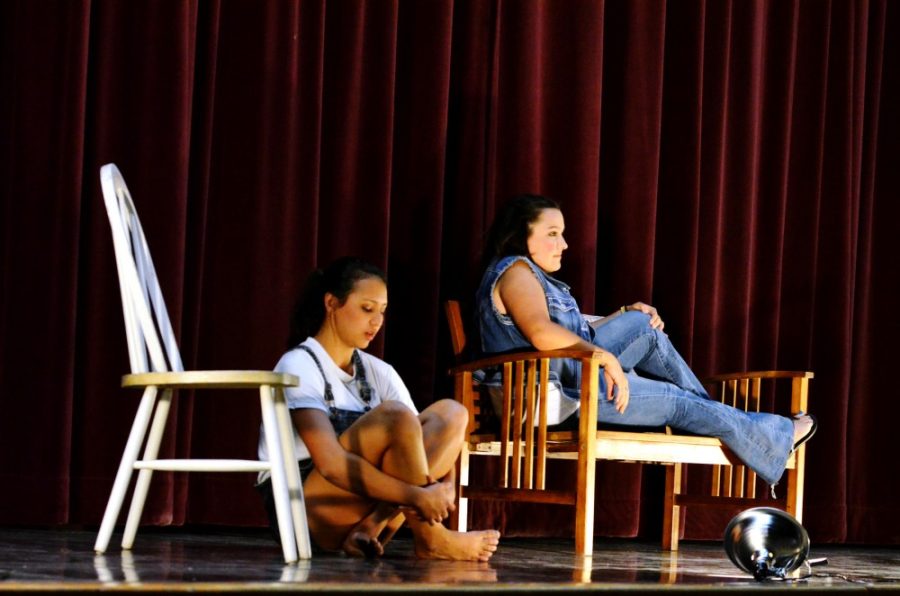The original version of this article used a misspelling of playwright Eve Ensler’s name. The Daily Wildcat regrets the error.
The Wildcat Community for Feminist Advocacy hopes to break the stigma typically associated with the word “vagina” with its production of “The Vagina Monologues” this weekend.
“I think the taboo comes from an entire history of shame and guilt that was imposed on women about their vaginas,” said Savannah Martin, WCFA president and political science senior. “There is a whole culture and guilt around women’s sexuality. Women are taught to not talk about their vaginas, and that periods are dirty.”
“The Vagina Monologues” is a play composed of interviews with real women that celebrates the trials and tribulations of being a woman.
“The stories were collected from a series of women around the world,” Martin said.
The play includes 17 monologues and scenes.
“In 1996, Eve Ensler [the playwright] had interviews with a huge group of diverse women of all ages and all acts of life,” said Heather Phillips, WCFA Vice President, stage director, cast member and theater design and technology senior. “She took the stories and compiled them into a collection of monologues that explore the challenges and joys of being a woman.”
Each year, Ensler writes an additional spotlight monologue that focuses on a current pressing issue. This year, there are two spotlights. The first is a personal testament by the playwright about her experience with sexual abuse from her father when she was a young woman. The second focuses on a call to action for the One Billion Rising for Justice Campaign by the international V-Day organization, which advocates for women’s rights.
“One of my favorite monologues is ‘The Angry Vagina,’ because this character recognizes all of the oppression and bullshit, and says she’s done,” Martin said. “I also like ‘The Woman Who Loves to Make Vaginas Happy.’ It’s a fun, sexy monologue that gets everyone riled up.”
The cast consists of 18 women, alongside a group of around 15 volunteers that assist with production. WCFA members’ main role in the monologues is production.
The actresses were cast through open auditions and were not all initially affiliated with the club, but Martin said she hopes that they will continue to be a part of WCFA after the show ends this weekend.
This is WCFA’s first year on campus. The club was created after the deterioration of the previous organization that produced the annual monologues, formerly the UA V-Day Vagina Warriors, according to Martin.
“When school started up this fall, we needed this to happen. We got the club together and organized the production,” Phillips said. She has been affiliated with the organizations since her freshman year. “It’s a community of strong, supportive, caring women trying to do their best for each other.”
All proceeds from the performance will benefit the UA Oasis Program, which is a sexual abuse prevention outreach organization at Campus Health Service. WCFA is affiliated with the program through internships offered by the club.
Phillips said she hopes the monologues will help women feel like they have access to similar outreach programs.
“Within the sorority and fraternity organizations, it’s a womanhood and a community of females sharing an environment,” Phillips said. “But when they go out at night, they are going out into risky situations because there is so little prevention outreach to all of the organizations.”
Martin said she wants to raise awareness of the struggles that women face, as well as honor the victories they have already achieved.
“I hope that they gain courage,” Martin said. “Part of ‘The Vagina Monologues’ is taking subjects like the vagina and sex and women’s lives and shattering the taboo.”
According to Martin, the play is not just for women, and is just as important for men because “there is not a single male that doesn’t have a woman in his life.” She said she hopes that men will reconsider their role in the general effort to combat violence against women and the effort to gain equality.
“‘The Vagina Monologues’ is for everybody,” Martin said. “It’s not about hating men, it’s about coming together and celebrating the women in our lives, how far we have come and how far we have to go.”









